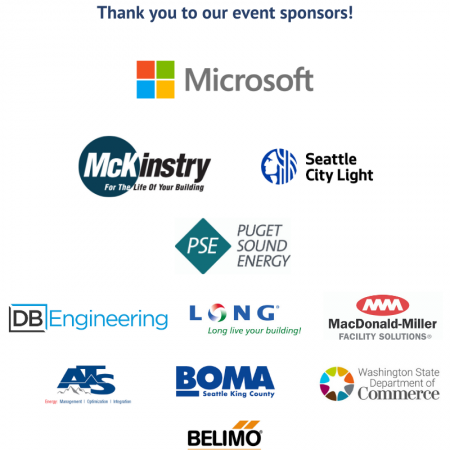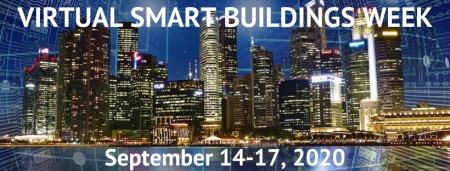
Due to the uncertainty surrounding holding large events during the COVID-19 pandemic and with the health, safety, and well-being of attendees as our top priority, the Smart Buildings Center is postponing the in-person Smart Buildings Exchange (SBX) Conference & Tradeshow until August 24th & 25th, 2021. The event will remain at the Bell Harbor Conference Center in downtown Seattle, and any tickets purchased for the 2020 dates will be honored for the 2021 dates or may be refunded. A special thank you to SBX event sponsors, Advisory Committee members, and session speakers for your understanding and flexibility as we make this shift. Although we are disappointed we are unable to hold the in-person event this year, we look forward to convening the industry in the summer of 2021 to cover the robust agenda topics we have developed while also enjoying outdoor socializing and networking.
In place of this year’s planned in-person event, we are hosting a free Virtual Smart Buildings Week September 14th-17th, 2020. Each day during the lunch hour, a virtual session crafted from key topics and speaker commitments for our planned in-person event will feature a lively and interactive panel discussion as outlined below. Registration for the first three virtual sessions on September 14th, 15th and 16th is now open and details for a fourth session on September 17th will be announced soon. These one-hour sessions each qualify for 1 Building Operator Certification (BOC) credential maintenance point and 0.10 IACET CEUs towards the renewal of industry certifications, certificates and licenses including but not limited to AIA, PE, LEED, IFMA, ASHRAE, and AEE.
Smart Buildings: Using Data and Analytics to Improve Performance
September 14th, 2020, 12:00 – 1:00 PM
This session brings together two leading local smart service providers and two facility directors who have real world experience bringing smart solutions to their buildings. Designing for optimal performance is no guarantee that it will happen. The ability to acquire system performance data is no guarantee that the data will trigger operational improvements. In these two case studies, buildings that should have been “top of their game” needed a new approach. Attendees will hear how ATS Automation and DB Engineering intervened to help facility directors collect relevant data from installed building systems, use analytical tools to provide insights into performance problems, and then – most importantly – help those facilities take action. The results speak for themselves. Improved energy performance that is persisting over time.
Moderator:
- Stan Price, Smart Buildings Center
Panelists:
- Pete Segall, ATS Automation
- Trevor Sodorff, DB Engineering
- Tim Wingert, CBRE
- Keith Berkoben, Google
Smart Buildings: Grid Enabled (and Efficient) Buildings
September 15th, 2020, 12:00 – 1:00 PM
Grid enabled buildings (GEB) are equipped with technologies for load management that can respond to dynamic conditions in the electric grid. GEBs are generally more efficient (HVAC, lighting, envelope, appliances), connected (hardware and software), smart (data and analytics), and flexible (loads, generation, storage). In an environment where hardware is increasingly attractively priced and a plethora of data is available, building owners are able to provide a significant benefit to a utility’s growing portfolio of resources and play a creative role in meeting its resource capacity needs in real time and for the long term. GEBs also offer the owner the additional value proposition of taking more control of their utility costs.
An expert, national panel will describe the key features of GEBs and outline the value streams that accrue to both the building owner and the serving utility in creating this grid enabled relationship. The panel will discuss both the technology required to create a two-way communication condition as well as the cost and benefits to all the parties in making GEBs a reality.
Moderators:
- Ben Levie, Seattle City Light; Mark Lenssen, Puget Sound Energy
Panelists:
- Alexi Miller, New Buildings Institute
- Cara Carmichael, Rocky Mountain Institute
- Mark Frankel, Ecotope
- Mary Ann Piette, Lawrence Berkeley Laboratory
Smart Buildings: Achieving Persistent Operational Performance
September 16th, 2020, 12:00 – 1:00 PM
Facility energy performance and operations are often in direct conflict. It’s tough to hear, but the scales are not balanced for building owners or operators. Social pressure, building codes and new legislation are pushing EUI targets lower and lower. Advanced energy systems and smart building controls tease easy answers during initial design and construction, but the harsh reality is that designing an efficient building does not translate to operations success and often only adds to reactive practices, deferred maintenance and risk. In most cases, operators are not prepared to take on complicated building systems and new-to-them technologies. With inadequate training or resources, overtaxed staff override system settings to simply make it work. The result inadvertently drives up energy consumption and negates all efforts to optimize energy performance during design and construction while reducing asset life and introducing unnecessary risks.
The transition to smart and sustainable operations offers a best practice that balances the scales between energy expectations and operational realities. Panelists will outline proven approaches on actual projects that bridge design, build, train, optimize to ensure current energy requirements are effective and met.
Moderator:
- Ric Cochrane, McKinstry
Panelists:
- Mike Kowalick, South Landing EcoDistrict
- Roy Buchert, Kaiser Permanente
- Norm Menter, University of Washington
Register now for these engaging virtual panel discussions during Smart Buildings Week!


